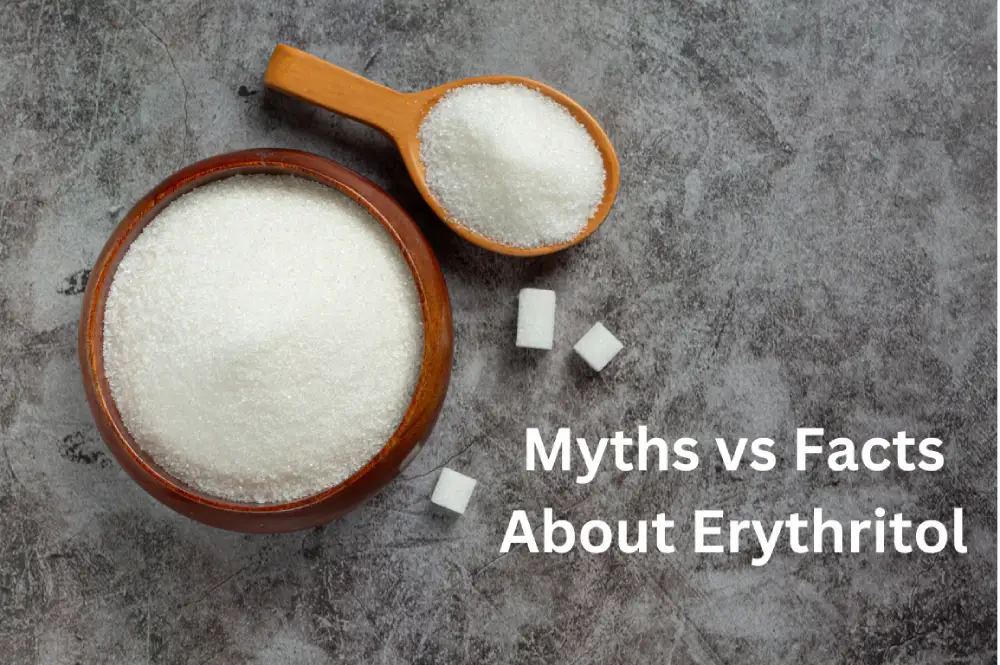What Are the Dangers of Erythritol? Myths vs Facts
satoria.admin
February 3, 2025

Erythritol has gained immense popularity as a sugar substitute, but with this rise in usage comes a wave of misconceptions. What are the dangers of erythritol, and how much of what we hear is fact or fiction? This article delves into common myths, potential side effects, and the safety profile of erythritol to help you make informed choices.
Erythritol is a sugar alcohol widely used as a low-calorie sweetener in various food products. Its growing usage has sparked curiosity and concern about its health implications. Is erythritol truly safe, or are there hidden risks? In this article, we will address these questions by examining the myths, potential side effects, and guidelines for safe consumption.
Common Myths About Erythritol
Myth 1: Erythritol Is Completely Artificial
A widespread belief is that erythritol is a purely synthetic substance. Fact: Erythritol is a sugar alcohol naturally occurring in certain fruits like pears, melons, and grapes. It is also produced through fermentation processes, making it a naturally derived ingredient.
Myth 2: Erythritol Causes Severe Digestive Issues for Everyone
While it is true that some sugar alcohols, like sorbitol or maltitol, can lead to bloating and gas, erythritol behaves differently. Fact: Erythritol is absorbed in the small intestine and excreted unchanged, reducing the risk of gastrointestinal discomfort for most individuals.
Myth 3: Erythritol Contributes to Weight Gain
Since erythritol contains very few calories, it does not significantly impact weight gain. Fact: It provides about 0.24 calories per gram, far less than sugar, making it a popular choice for weight management.
Potential Side Effects of Erythritol
Erythritol is widely regarded as a safe and effective sugar alternative, offering numerous benefits, especially for those seeking to reduce calorie intake. However, as with any food ingredient, it’s important to consider individual sensitivities and unique health needs.
Suitability for Specific Health Conditions
Erythritol has minimal impact on blood sugar levels, making it a popular choice for diabetics and those monitoring glucose levels. However, individuals with certain metabolic conditions should discuss their dietary choices with a healthcare provider to ensure erythritol aligns with their overall health plan.
By understanding your body’s unique needs and using erythritol in appropriate quantities, you can enjoy its benefits as a natural, low-calorie sweetener with confidence.
Is Erythritol Safe for Everyone?
Safety for Children
Children can safely consume erythritol in moderate amounts, but excessive intake should be avoided to prevent potential digestive issues.
Suitability for Pregnant or Breastfeeding Women
Erythritol is generally recognized as safe (GRAS) for pregnant and breastfeeding women. However, it is always prudent to seek advice from a healthcare provider when introducing new foods or supplements during this period.
Compatibility with Specific Diets
Erythritol is compatible with:
- Ketogenic diets
- Diabetic-friendly plans
- Gluten-free diets
Its low glycemic index makes it an ideal option for individuals managing blood sugar levels.
FAQs About Erythritol
Yes, erythritol is heat-stable and can be used in baking and cooking. However, its sweetness is about 70% of regular sugar, so adjustments may be needed in recipes.
Yes, erythritol is keto-friendly due to its zero net carbs and negligible impact on blood sugar.
Unlike some artificial sweeteners, erythritol has no bitter aftertaste. It offers a clean, sweet flavor similar to sugar.
Studies suggest that consuming up to 1 gram per kilogram of body weight per day is generally well-tolerated by most people.
Tips for Using Erythritol Safely
To maximize the benefits of erythritol while minimizing potential side effects:
- Start Small: Begin with small amounts to gauge your tolerance.
- Combine with Other Sweeteners: Mixing erythritol with other natural sweeteners can improve taste and reduce the likelihood of digestive discomfort.
- Choose Quality Products: Opt for high-purity erythritol products like those available at Satoria Nutrisentials.
Conclusion
Erythritol is a versatile, low-calorie sweetener with a strong safety profile for most people. While myths surrounding its dangers persist, scientific evidence highlights its benefits and mild potential side effects. By consuming erythritol in moderation, you can enjoy its sweetness without significant risks.
Ready to explore healthier sweetening options? Visit Satoria Nutrisentials to find premium erythritol and other quality products. Make the switch to smarter sweetness today!